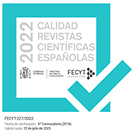ISSN-e: 1989-3302
DOI: 10.30827/rl
Submission Guidelines
1. Manuscript submission
All the proposals must be submitted online through this platform. To do so, you must register here.
2. General guidelines
Revista Letral follows the specifications of the MLA Style. The journal uses Works Cited lists and footnotes rather than endnotes. We urge authors to cooperate in careful manuscript preparation and adherence to this guide and the MLA Style.
- All contributions must be submitted in a form ready for publication.
- The submissions should be the result of personal research, and should not have been previously published.
- Use a simple line spacing, a Georgia font of 12 points and a page size of 3 cm on each side.
- Recommended length: 5.000-10.000 words for articles and 1.500-2.000 words for reviews (including notes and bibliography).
- Abstracts of 100-150 words, followed by a list of 4 key words, are required for all manuscripts submitted. Both should be send in English and Spanish.
- Manuscripts should be compiled in the following order:
- Title in English and Spanish.
- Full name, affiliation, email address, and Orcid code. Please note that the email address of the corresponding author will normally be displayed in the article PDF.
- Funding and grant-awarding bodies in a note
- Abstract and keywords in English and Spanish.
- Main text, references and appendices.
3. Style guidelines
Notes:
- The journal uses Works Cited lists and footnotes rather than endnotes. Footnotes should be limited to authorial commentary that cannot be easily accommodated into the body of the text.
- Notes must not be used to make references that should appear in parenthetical documentation within the text.
- Format: simple line spacing and Georgia font of 10 points.
Quotations:
- Use double quotation marks (“of this kind”) for quotes of four lines or less and single quotation marks for quotes within quotes or for speech within a quotation.
- When a quotation is four lines or more, it must be indented as a separate paragraph (1,5 cm) in 11 points and without quotation marks. A quote within an indented quotation requires single quotation marks.
- Commas and periods must be placed after the quotation marks, but the symbols for interrogation or exclamation intrinsic to the quote’s meaning should be kept within the quotation marks.
- Omissions within quoted text are indicated by three consecutive periods within brackets: […].
In-text citations:
- Revista Letral format follows the author-page method of in-text citation. This means that the author’s last name and the page number(s) from which the quotation or paraphrase is taken must appear in the text, and a complete reference should appear on your Works Cited page. For example:
- If the title of the work referred to has been recently mentioned, indicate only the page number in parentheses (265).
- If the title is not mentioned and the author appears only once in the bibliography, write in parentheses (Ortega 374).
- If the author appears in the bibliography more than once, write in parentheses (Piglia, El último lector 27).
- If the title is long, you can write a short reference (Alberti, I was a fool 77), instead of (I was a fool and what I have seen has made me two fools 77).
- The same reference will appear developed at the end of the article within the bibliography.
- References to scientific publications of WOS and the journal itself will be positively valued.
Works Cited:
[Books]
Last Name, First Name. Title of Book. City, Publisher, Year.
Zambrano, María. Los intelectuales en el drama de España. Madrid, Hispamérica, 1977.
[Articles]
Author(s). “Title of Article”. Title of Journal, Volume, Issue, Year, pages.
Borges, Jorge Luis. “Un llamado a la realidad. ¿Madrid, meridiano intelectual de Hispanoamérica?”. Martín Fierro (edición facsimilar), n.º 42, 1995, p. 357.
[Chapters]
Last name, First name. “Title of Essay”. Title of Collection, Editor’s Name (ed.), City, Publisher, Year, Pages.
Exner, Isabel (2015). “Islas inundadas por el futuro. Los paisajes invisibles de una literatura cyberpunk cubana”. Paisajes sumergidos. Paisajes invisibles. Formas y normas de convivencia en las literaturas y culturas del Caribe, Ottmar Ette y Gesine Müller (eds.), Berlín, Verlag Walter Frey, pp. 127-145.










